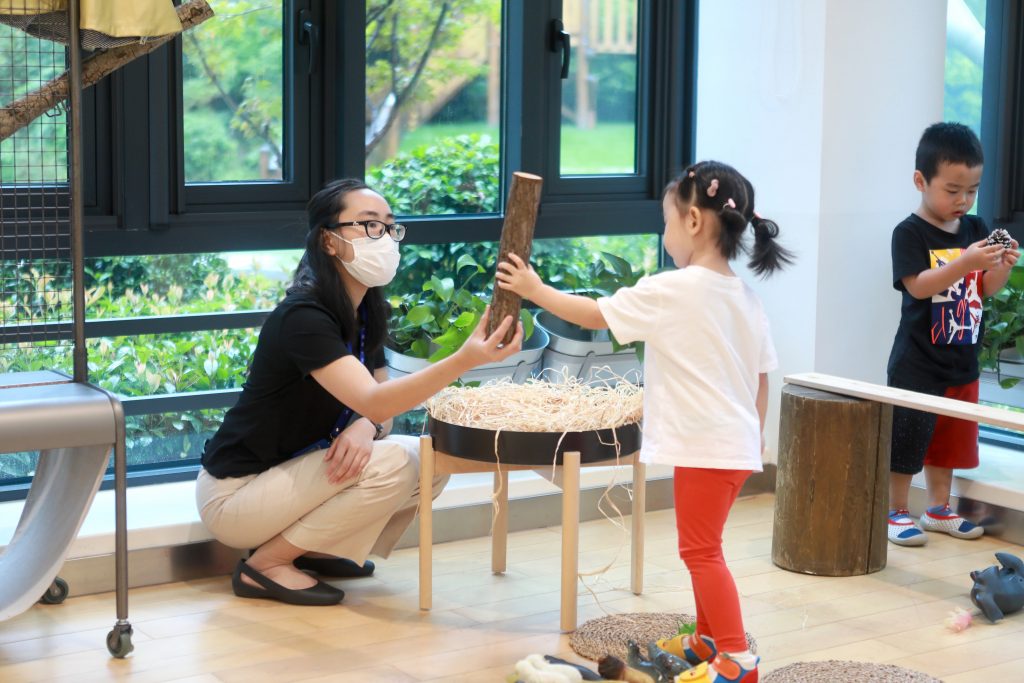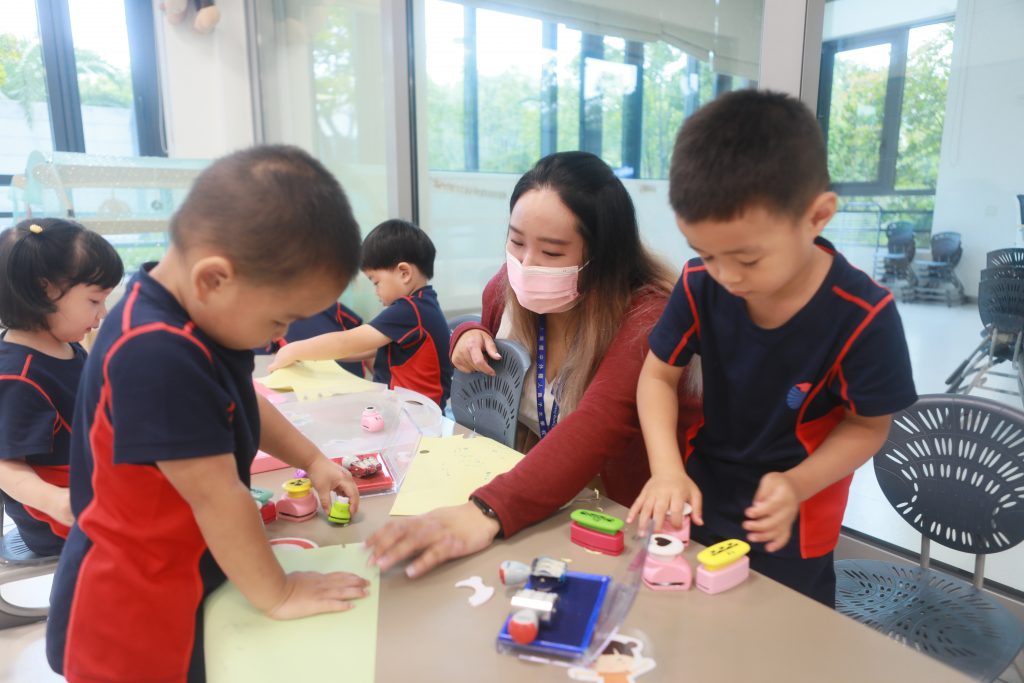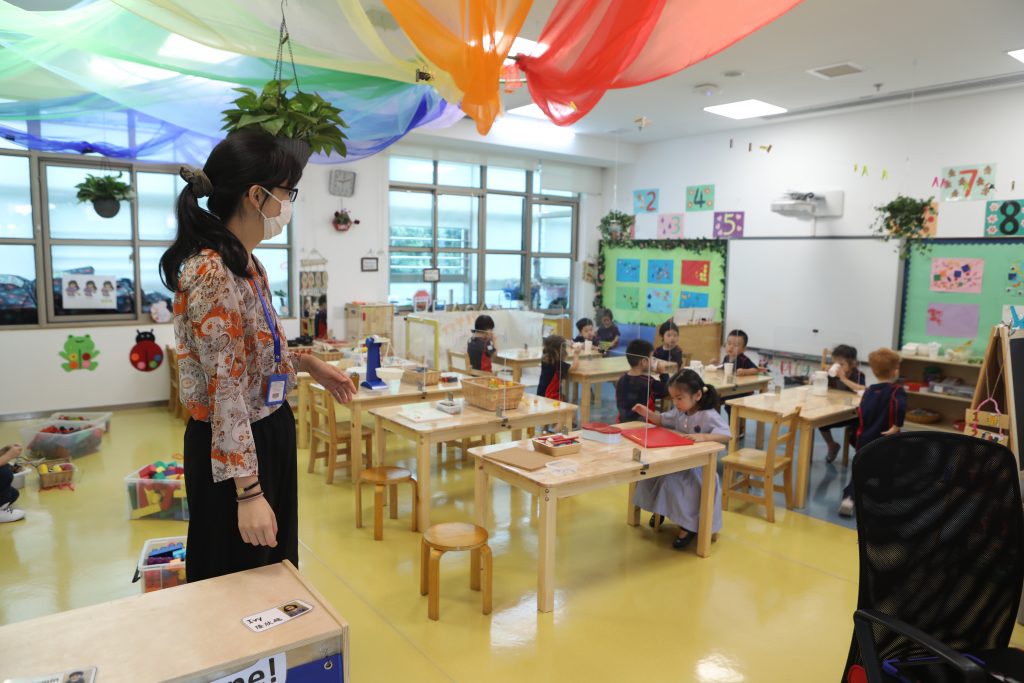How Our Star Graduates Put the Notion of “Learn through Play” into Practice

For Teachers of Tomorrow from Yew Chung College of Early Childhood Education, dealing with crying toddlers and sorting arguments over favourite toys, is a snap. Here’s why.
Yew Chung College of Early Childhood Education (YCCECE) launched its Teachers of Tomorrow (ToT) scheme in 2016. Under this arrangement, Yew Chung International Kindergartens open their doors to outstanding graduates from YCCECE, offering an educational pathway known as “From Baby to Bachelor”. These Teachers of Tomorrow are encouraged to practice what they have learned. This year, Yew Chung International Kindergartens in Shanghai hired three YCCECE graduates as international teachers.
“International schools in Hong Kong, including YCIS, tend to recruit teachers with ample experience and holding a relevant degree,” Lin, Head of YCCECE Student Affairs Office, says. “However, we have a lot of faith in our graduates. The ToT scheme allows them to earn valuable early childhood education experience, so they will be able to innovate throughout their teaching career.”
The Yew Chung kindergarten international and bilingual teaching teams have adopted “Learning through Play” as an important pedagogic tool. For these graduates, it is an excellent starting point of their professional life. Past teachers recruited into the ToT scheme have stood out and received accolades from colleagues and parents alike. They were all invited to renew their contracts to teach at Yew Chung.
In these interviews we talk with five current Teachers of Tomorrow at Yew Chung who share their goals with us. They also talk about how their higher education experience at YCCECE was rewarding in several ways and helped them reach career goals.

You can reach for the moon at Yew Chung
“They all performed admirably during their internship, and made tremendous contributions to the college. Not only are they advocates of children’s rights and welfare, but they are also true believers of play-based learning,” observes Lin, YCCECE’s Head of student affairs office.
When Harriet Chan was young she volunteered at a kindergarten for 10 years to help toddlers learn. She received a Community Service Award by the Hong Kong Social Welfare Department for her work. She went to a local school but due to ‘ineffective’ teaching her learning was adversely impacted. This experience taught her the value of an inspiring teacher early on in a child’s life. International schools’ approach to teaching appeals to Harriet as children tend to learn better in a more nurturing environment.
After completing her higher diploma she entered the bachelor degree programme. Last New Year’s Eve, a professor asked Harriet to write down her goal on a piece of paper, on which she wrote, “graduate with first-class honours.” Harriet got a perfect 4.0 GPA, up from an already admirable 3.6.
The lecturers motivated her to reach for the moon. She learned to leave her comfort zone and set herself new challenges. She applied for a Teacher of Tomorrow position at Yew Chung International Kindergarten in Shanghai and began to stand on her own two feet away from home. Her years at YCCECE prepared her for success as she regained confidence. “YCCECE helped me become a new person. I think it is my destiny to be an early childhood educator,” she says.
Like Harriet, Karen Yip and Carmen Chan are both idealistic young educators who also started teaching at Yew Chung in Shanghai. As English is the medium of instruction at YCCECE, Karen and Carmen feel very comfortable working in an international school environment. Being bilingual, they can communicate with parents easily in Chinese too.
Having had internship experience during their college years, Karen and Carmen prefer the international school teaching approach. The emergent curriculum, for instance, is more consistent with the approach they have learned at YCCECE. Says Karen, “At many international schools, academic results are still very much emphasised. Yew Chung’s philosophy allows children to ‘learning through play.’ As we have just begun our teaching career, we are still exploring how best to put this notion into practice.”
Play-based teaching is best illustrated through everyday practice. In her first two weeks at the kindergarten, Karen observed a child who was able to learn and remember the word “elephant” as the child constantly played with a toy elephant. To her surprise, a few days later, the child told Karen that there were also toy elephants in other classrooms. In this instance, learning was enhanced through observation, association, and expression.
Elis Cheung and Suki Hui chose to stay in Hong Kong, and began their career as teaching assistants at Yew Chung International Kindergartens. “At local kindergartens, classes are led by teachers. However, at Yew Chung, a child-centred teaching approach is preferred in order to respect children’s interests, choices, and thoughts. Curriculum design is also based on this notion. Using innovative materials, Yew Chung’s educators focus on children’s creativity, such as art and technological ingenuity. These pedagogical approaches are consistent with our teaching philosophy,” Elis says.
The College’s greatest influence on our Teachers of Tomorrow is the notion of play-based teaching. Suki hopes that this approach, which allows children to enjoy educational play experience, can be adopted in more preschools in Hong Kong. When she applied for jobs, she paid close attention to the curricula, and checked if they were compatible with her teaching philosophy. Suki notes, “Hong Kong’s early childhood education field is relatively saturated – the applicant-to-hire ratio can be as high as 400:1 – so the ToT scheme is a precious opportunity.”
Elis is the only Higher Diploma graduate of the five Teachers of Tomorrow. She was grateful for this opportunity in this highly competitive landscape. Every Saturday, she studies for the bachelor degree programme. She expects to earn her degree in four years. For the next few years, she hopes to stay on at Yew Chung.

Learning from Shared Experience
“It is a privilege to graduate from YCCECE and teach at Yew Chung International Kindergartens in Shanghai. When it comes to teaching, the school and I share the same beliefs. I just need to practice what I have learned,” says Carmen.
Due to the pandemic, parents are no longer allowed to enter the school premises. Instead of face-to-face conversations, teachers have to put in more time and effort to communicate with parents. Our Teachers of Tomorrow tackle the challenges in various ways.
Harriet talks to parents on the phone and via Zoom. Carmen uploads photos to the Seesaw platform so parents can see what’s going on in the classroom to allay any anxiety. Karen got a few helpful tips from more experienced co-teachers. When talking to parents about their children, she uses the child’s Chinese name and keeps it brief. Her focus is on the children.
Teaching is a rewarding experience but can be stressful too. Since the beginning of the school year the young teachers have made the transition from teaching small groups to managing an entire class. There are several challenges. Helping children to cope with separation anxiety, for one. Young children often miss their mothers and cry. Patience is required to calm them down. During the pandemic children have not played with other kids for a while so they are less ready to share and often fight over their favourite toys. Again, it takes patience to teach good behaviour.
In Carmen’s class the youngest child cried almost daily. So she came up with a brilliant solution. Each day she gave the little boy a number of photos of him that Carmen had taken and printed. When he finished this routine, Carmen would take one photo away from him. As the number of photos he had in hand dwindled, the child had an idea of how much time was left for school before he reunited with his family. Over a few days the youngest boy in the class was crying a lot less.
“Although we all learned about various pedagogical theories in college, we sometimes review reference books and lessons,” Harriet reflects. Supervisors who are experts in the early childhood education field are great resources for the young teachers. Through weekly meetings and class observation, supervisors offer useful suggestions. For instance, when children fight over glue and stationery. As Harriet explains, “I was told not to worry too much as kids will be kids. It is the easiest just to fetch more stationery for them. Supervisors’ advice reminds me to be practical. Supervisors helped me see through blind spots and to be more flexible.”
At Yew Chung International Kindergartens in Hong Kong, the principal and assistant principal take turns every week to hold a seminar with Elis and Suki. They discuss difficulties that the young teachers have encountered and suggest reference books for Elis and Suki. Elis learned from the principal a ‘spot casting’ technique that helps children understand and express their emotions objectively. As Elis works with two-year-old toddlers whose vocabulary is fairly limited, she needs to pay more attention to their needs, and teach the children useful words to interact with them.
Suki is particularly impressed with the work culture at Yew Chung in Hong Kong, where working overtime is discouraged and a meaningful work life balance is sought. Moreover, colleagues have lots of opportunities to interact with one another and young teachers are encouraged to share their views. Students from YCCECE come to visit often so, for her, it feels like homecoming at times.
On September 23, school resumed for kindergartens in Hong Kong. Elis and Suki sprang back into action as they prepared teaching aids and ordered new uniforms. They also took care of the children and played with them. These so-called trivial tasks are all equally important for the children.
As a freshly minted teacher, Harriet hopes she can contribute to the class and make a difference, starting with the basics. Her latest classroom decoration has won praise from colleagues. She studies the curricula of Hong Kong and the United Kingdom, and designs her own curriculum and teaching plans.
At home, Carmen and Karen compile their own song lists. They search for new songs to cater to the children’s interests and give them a sense of novelty. They learn how to sing the songs at home so they can teach the children to sing along with everyone in class.
“Yew Chung is where I can put what I have learned into practice,” Suki enthuses. “Children get excited easily with so many things so designing a curriculum to cater to their interests is no easy task. Yew Chung’s teachers are some of the best in the field, and it is up to me to learn as much as possible from them while teaching here.”